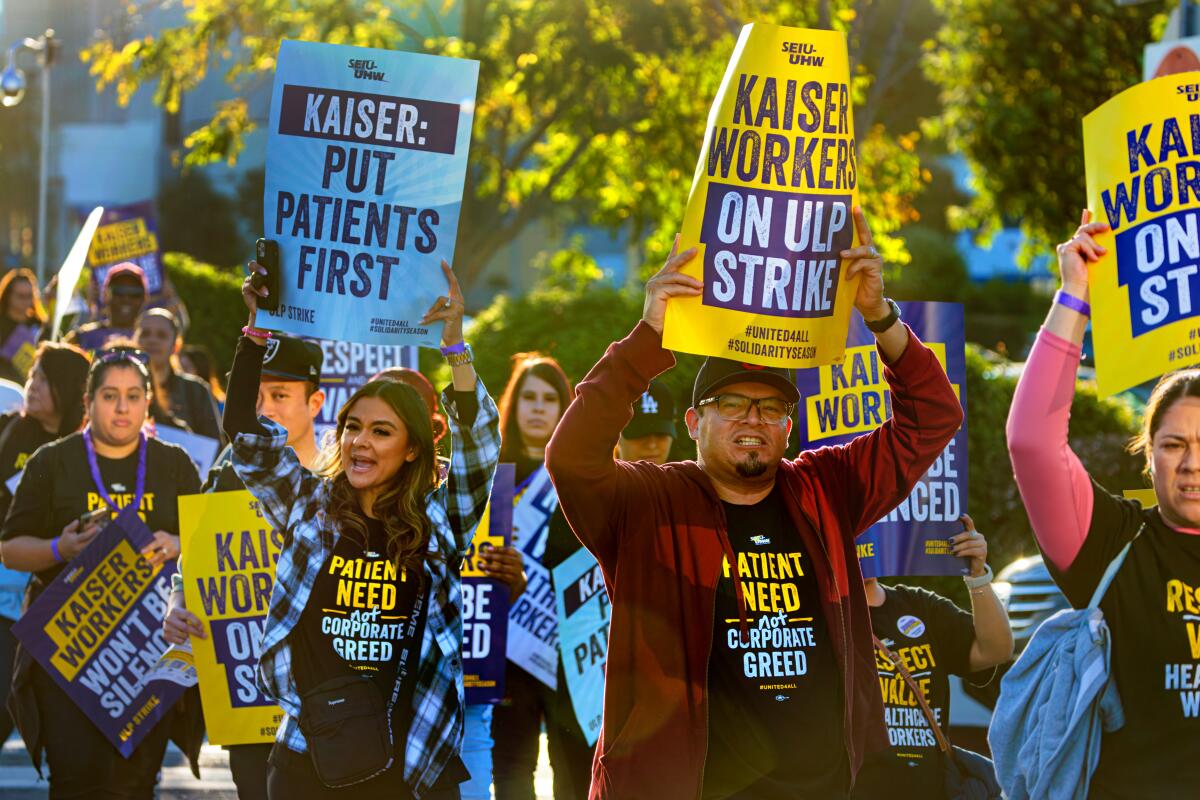Gov. Newsom’s response to the wave of California labor bills? It’s a mixed bag

- Share via
Good morning. It’s Wednesday, Oct. 11. Here’s what you need to know to start your day.
- Newsom’s mixed bag of action on labor bills
- An Israeli hostage’s family is determined to get him back
- Learn how to take majestic night sky photography in Joshua Tree
- And here’s today’s e-newspaper
Sign up for Essential California
The most important California stories and recommendations in your inbox every morning.
You may occasionally receive promotional content from the Los Angeles Times.
Gov. Newsom’s response to the wave of California labor bills? It’s a mixed bag
Labor issues have been in the spotlight over the last year, with headline-making strikes by UC workers, thousands of LAUSD’s non-teaching staff, Hollywood writers, hotel workers, the Screen Actors Guild, healthcare workers and autoworkers.
All that momentum around workers’ rights, fair contracts and union power spurred movement in Sacramento, culminating with a stack of labor-backed bills sent to the governor’s desk.
“The tug of war between labor and business is a constant in the California Capitol,” The Times’ Sacramento bureau chief Laurel Rosenhall wrote in the California Politics newsletter last month. “What was different this year: several new lawmakers with a progressive streak, a new Assembly Speaker who put his muscle behind some of labor’s priorities and ongoing strikes in Southern California that have pushed many politicians to publicly side with workers.”
Gov. Gavin Newsom’s response to those bills has been a mixed bag for California labor groups, who are in turn applauding him for signing some laws or voicing disappointment with him for vetoing legislation they championed.
Which has he signed?
- Senate Bill 616, which guarantees all workers in the state at least five paid sick days (right now the minimum is three).
- Assembly Bill 1228, which will raise wages for fast food workers to $20 an hour and avert an expensive ballot measure fight with the restaurant industry.
- Assembly Bill 1, which will allow California’s legislative staffers to organize unions. The soonest those workers could vote to unionize and collectively bargain with their bosses at the capitol will be 2026.
What did he veto?
- Newsom blocked Senate Bill 799, which would have allowed workers on strike to receive unemployment benefits. In his veto message, Newsom said that the state’s Unemployment Insurance program is billions of dollars in the hole and that “now is not the time to increase costs or incur this sizable debt.”
- Senate Bill 686, which would have established California as the first state in the nation to include housekeepers, nannies and other household staff in health and safety protection laws. Unions and immigrant rights advocates had long pushed for those workers to be protected the way many other workplaces are under OSHA rules. But Newsom voiced concerns “that this bill creates severe cost burdens and penalties for many people who cannot afford them,” writing that a large share of households that employ domestic workers are low-income as well.
- AB 1356, which aimed to extend the notice workers get for upcoming layoffs from 60 days to 75 days and expand that notice to contract workers, who employers are not currently required to give any notice of layoffs. In his veto message, Newsom said the bill could create liability for employers “who cannot reasonably be expected to know whether their actions will cause job loss for employees of their subcontractors.”
- Newsom also kept his pen off AB 316, which would have required a human safety driver on board autonomous trucks. Labor groups expressed frustration, saying the governor’s decision will make roads more dangerous and lead to massive job loss. Newsom argued that “existing law provides sufficient authority to create the appropriate regulatory framework.”
How labor leaders are responding
Lorena Gonzalez, executive secretary-treasurer of the California Labor Federation, said Newsom’s approval of incoming laws that will boost paid sick days and increase wages for hundreds of thousands of workers are worth celebrating.
“Where we’re disappointed is that we offered a number of bills that were specifically designed to strengthen the rights of union members and … empower workers to take this economy into their own hands,” she told me. “That’s where we had trouble getting bills [signed].”
The federation is made up of 1,200 labor unions across the state. Gonzalez said their priority is to address income inequality by ensuring that “workers and their voice are at the center of an economic recovery that we’ve been left out of for too long.”
“Government has not been able to fix this economy, and even a progressive government that looks out for workers,” she said. “We have to expand unions, we have to give workers more power in their job site, we have to ensure that when workers go on strike, they have the support that is necessary so they’re not forced to take a bad deal.”
She’s also noticed some politicians taking notice of “the resurgence of unions and their strength.”
“I think they’re seeing the frustration of workers who have contributed to making California the fourth or fifth strongest economy in the world, but yet aren’t being really paid back for that,” she added.
And despite buzzy media words like “Striketober” and “Hot Labor Summer,” Gonzalez said labor issues aren’t seasonal trends, but a complex movement in which workers will continue to organize and advocate for fair contracts — especially with negotiations in the works or set to start for CSU workers, Teamsters, the International Alliance of Theatrical Stage Employees and more.
“We have a lot of workers who are going to demand more at the table,” she said. “We’re hopeful to resolve these things … quickly at the bargaining table, but that’s going to require some give by these corporations and public entities.”
Today’s top stories

War in the Middle East
- This Israeli couple’s son is in enemy hands. They’re determined to get him back.
- What you need to know about Hamas.
- The attacks in Israel stranded a Mexican gymnastics team. Their coach pleads for help.
- Ex-Israeli soccer player Lior Asulin was among more than 260 killed by Hamas at a rave.
- Dean Kremer spends time every year with family in Israel. Now he’ll pitch for the Orioles with a heavy heart.
The latest from Sacramento
- Newsom signs a bill that requires California State University to report sexual harassment cases, following Los Angeles Times reports.
- Newsom signs a bill that would make it easier to delete online personal data.
- A bill to allow Amsterdam-style cannabis cafes in California goes up in smoke with a Newsom veto.
- Newsom vetoes bills that would have mandated independent redistricting for L.A.
COVID in Los Angeles
- L.A. COVID-19 cases are falling again after a summer uptick. Officials now brace for winter.
- The updated COVID-19 vaccine is now available at all eight of L.A. County’s public health centers as well as clinics near Watts and East L.A.
Climate and environment
- Engineering buried L.A.’s river. Artist Lauren Bon is engineering a plan to free it.
- How L.A.’s bird population is shaped by historic redlining and racist loan practices.
SoCal Sports
- Column: Dodgers prepare for elimination game in their home away from home.
- ‘I don’t want to have regrets.’ USC’s Lincoln Riley tries to balance family and football.
- ‘I live and die by adrenaline.’ A day with the voice of the Dodgers’ Rancho Cucamonga Quakes.
More big stories
- The sexual abuse scandal that haunts Trump’s pick for House speaker.
- Disneyland announces another round of price hikes in time for the holiday season.
- Created in California: Packaging pleasure, one sex toy at a time.
- Cameras, cops and paranoia: How Amazon’s surveillance network alters L.A. neighborhoods.
- Walgreens pharmacy staffers walk out across the U.S., citing unsafe working conditions.
- Mary Lou Retton is hospitalized with pneumonia, unable to breathe on her own, daughter says.
- The cheap streaming era is over. Here’s why your bills are going up.
- A 2,749-pound gourd sets the world record at the Super Bowl of competitive pumpkin-growing.
- What you need to know about the ‘ring of fire’ solar eclipse that’s coming Saturday.
Get unlimited access to the Los Angeles Times. Subscribe here.
Commentary and opinions
- Eric Sondheimer: It’s a big week of showdowns, starting and ending with Mater Dei vs. St. John Bosco
- Robin Abcarian: Why don’t women make as much as men? Economist Claudia Goldin has some Nobel Prize-winning answers.
- Opinion: I’m an Israeli student and peace activist. Here’s what being in Tel Aviv has been like since Hamas attacked.
- Opinion: How Netanyahu’s political calculations resulted in catastrophe.
- Editorial: Steve Garvey wants to make the California GOP relevant again. Good luck with that.
- Lorraine Ali: Elon Musk bought Twitter just to break it. With a new war, we’re paying the price.
Today’s great reads

‘America does not deserve me.’ Why Black people are leaving the United States. Exhausted by anti-Black discrimination and violence back home, they are building communities in countries such as Costa Rica, Portugal, Ghana, Colombia and Mexico. Often referred to as “Blaxit,” the movement has been boosted by social media, where influencers share inspirational posts about their odysseys abroad and challenge others to join them.
Other great reads
- Afro Salvadorans faced erasure. Now they are reclaiming their place in the country’s history.
- Our kids died in a crash on the way to Joshua Tree. How could we ever go back?
- A historian uses street art to illustrate the centrality of Latinos in Santa Barbara.
How can we make this newsletter more useful? Send comments to [email protected].
For your downtime

Going out
- 📸 You can take majestic night sky photos in Joshua Tree. Here’s a class for that.
- 🛀🏽 A Venice ice bath studio plays matchmaker for speed daters.
- ☠️ Universal Horror Nights is bringing the spooky tales of Latin America to life.
Staying in
- 💻 The Times compiled a series of excerpts from various unproduced scripts and screenplays. Some were written by human WGA members, while others were written by AI. Can you tell which is which?
- 📙 What’s up with the MCU? A new book chronicles Marvel Studios’ reign and stumbles.
- 🏈 What do USC and UCLA have to do to win their top 25 games Saturday?
- 🥘 Here’s a recipe for sweet-and-sour pork tenderloin.
- ✏️ Get our free daily crossword puzzle, sudoku, word search and arcade games.
And finally ... a great photo

Today’s great photo is from Jill Connelly at the Indigenous People’s Day East Los Angeles music and arts festival, a free, all-day event that included Indigenous singers and dancers, a traditional ballgame demonstration and an artisan market.
Have a great day, from the Essential California team
Ryan Fonseca, reporter
Elvia Limón, multiplatform editor
Kevinisha Walker, multiplatform editor
Laura Blasey, assistant editor
Check our top stories, topics and the latest articles on latimes.com.
Sign up for Essential California
The most important California stories and recommendations in your inbox every morning.
You may occasionally receive promotional content from the Los Angeles Times.




